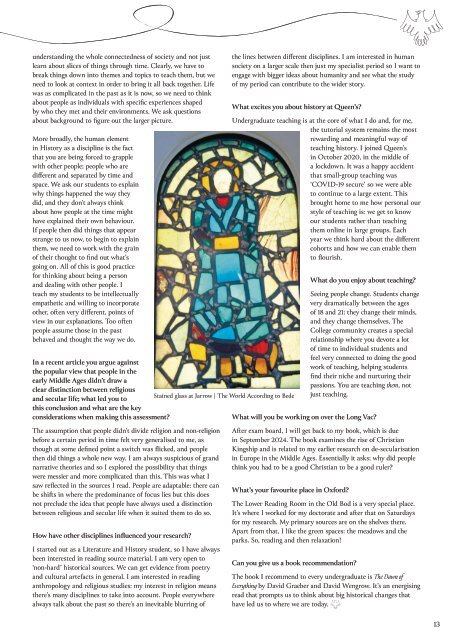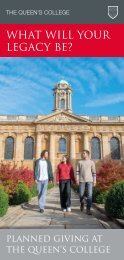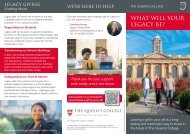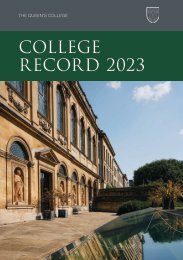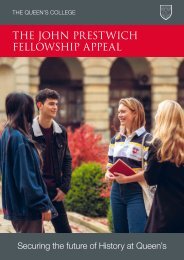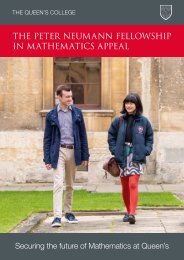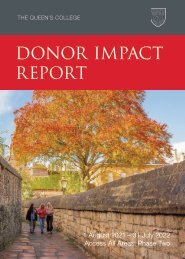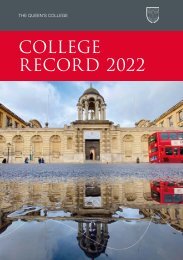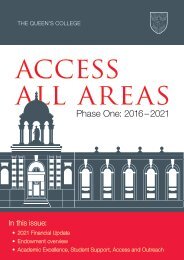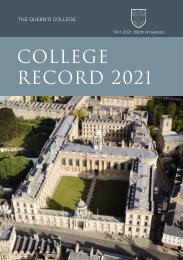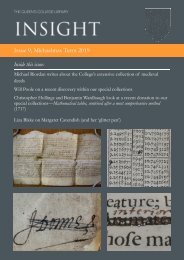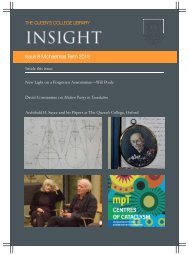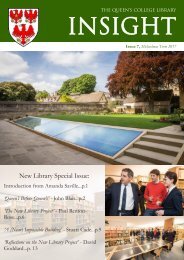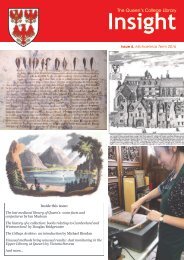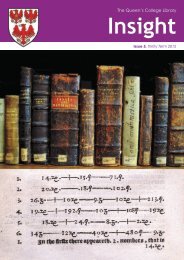Eagle Eye Magazine Issue 1 2023
Take a dive into the research and work that's going on at The Queen's College and beyond its walls within the community of Old Members. In issue one, we celebrate Shakespeare's First Folio, ask our history Fellows what makes them passionate about their subject, explore the new accessible Porters' Lodge, ask a current student about how to engage positively with climate issues, and much more.
Take a dive into the research and work that's going on at The Queen's College and beyond its walls within the community of Old Members. In issue one, we celebrate Shakespeare's First Folio, ask our history Fellows what makes them passionate about their subject, explore the new accessible Porters' Lodge, ask a current student about how to engage positively with climate issues, and much more.
You also want an ePaper? Increase the reach of your titles
YUMPU automatically turns print PDFs into web optimized ePapers that Google loves.
understanding the whole connectedness of society and not just<br />
learn about slices of things through time. Clearly, we have to<br />
break things down into themes and topics to teach them, but we<br />
need to look at context in order to bring it all back together. Life<br />
was as complicated in the past as it is now, so we need to think<br />
about people as individuals with specific experiences shaped<br />
by who they met and their environments. We ask questions<br />
about background to figure out the larger picture.<br />
More broadly, the human element<br />
in History as a discipline is the fact<br />
that you are being forced to grapple<br />
with other people: people who are<br />
different and separated by time and<br />
space. We ask our students to explain<br />
why things happened the way they<br />
did, and they don’t always think<br />
about how people at the time might<br />
have explained their own behaviour.<br />
If people then did things that appear<br />
strange to us now, to begin to explain<br />
them, we need to work with the grain<br />
of their thought to find out what’s<br />
going on. All of this is good practice<br />
for thinking about being a person<br />
and dealing with other people. I<br />
teach my students to be intellectually<br />
empathetic and willing to incorporate<br />
other, often very different, points of<br />
view in our explanations. Too often<br />
people assume those in the past<br />
behaved and thought the way we do.<br />
In a recent article you argue against<br />
the popular view that people in the<br />
early Middle Ages didn’t draw a<br />
clear distinction between religious<br />
and secular life; what led you to<br />
Stained glass at Jarrow | The World According to Bede<br />
this conclusion and what are the key<br />
considerations when making this assessment?<br />
The assumption that people didn’t divide religion and non-religion<br />
before a certain period in time felt very generalised to me, as<br />
though at some defined point a switch was flicked, and people<br />
then did things a whole new way. I am always suspicious of grand<br />
narrative theories and so I explored the possibility that things<br />
were messier and more complicated than this. This was what I<br />
saw reflected in the sources I read. People are adaptable: there can<br />
be shifts in where the predominance of focus lies but this does<br />
not preclude the idea that people have always used a distinction<br />
between religious and secular life when it suited them to do so.<br />
How have other disciplines influenced your research?<br />
I started out as a Literature and History student, so I have always<br />
been interested in reading source material. I am very open to<br />
‘non-hard’ historical sources. We can get evidence from poetry<br />
and cultural artefacts in general. I am interested in reading<br />
anthropology and religious studies: my interest in religion means<br />
there’s many disciplines to take into account. People everywhere<br />
always talk about the past so there’s an inevitable blurring of<br />
the lines between different disciplines. I am interested in human<br />
society on a larger scale then just my specialist period so I want to<br />
engage with bigger ideas about humanity and see what the study<br />
of my period can contribute to the wider story.<br />
What excites you about history at Queen’s?<br />
Undergraduate teaching is at the core of what I do and, for me,<br />
the tutorial system remains the most<br />
rewarding and meaningful way of<br />
teaching history. I joined Queen’s<br />
in October 2020, in the middle of<br />
a lockdown. It was a happy accident<br />
that small-group teaching was<br />
‘COVID-19 secure’ so we were able<br />
to continue to a large extent. This<br />
brought home to me how personal our<br />
style of teaching is: we get to know<br />
our students rather than teaching<br />
them online in large groups. Each<br />
year we think hard about the different<br />
cohorts and how we can enable them<br />
to flourish.<br />
What do you enjoy about teaching?<br />
Seeing people change. Students change<br />
very dramatically between the ages<br />
of 18 and 21: they change their minds,<br />
and they change themselves. The<br />
College community creates a special<br />
relationship where you devote a lot<br />
of time to individual students and<br />
feel very connected to doing the good<br />
work of teaching, helping students<br />
find their niche and nurturing their<br />
passions. You are teaching them, not<br />
just teaching.<br />
What will you be working on over the Long Vac?<br />
After exam board, I will get back to my book, which is due<br />
in September 2024. The book examines the rise of Christian<br />
Kingship and is related to my earlier research on de-secularisation<br />
in Europe in the Middle Ages. Essentially it asks: why did people<br />
think you had to be a good Christian to be a good ruler?<br />
What’s your favourite place in Oxford?<br />
The Lower Reading Room in the Old Bod is a very special place.<br />
It’s where I worked for my doctorate and after that on Saturdays<br />
for my research. My primary sources are on the shelves there.<br />
Apart from that, I like the green spaces: the meadows and the<br />
parks. So, reading and then relaxation!<br />
Can you give us a book recommendation?<br />
The book I recommend to every undergraduate is The Dawn of<br />
Everything by David Graeber and David Wengrow. It’s an energising<br />
read that prompts us to think about big historical changes that<br />
have led us to where we are today.<br />
13


